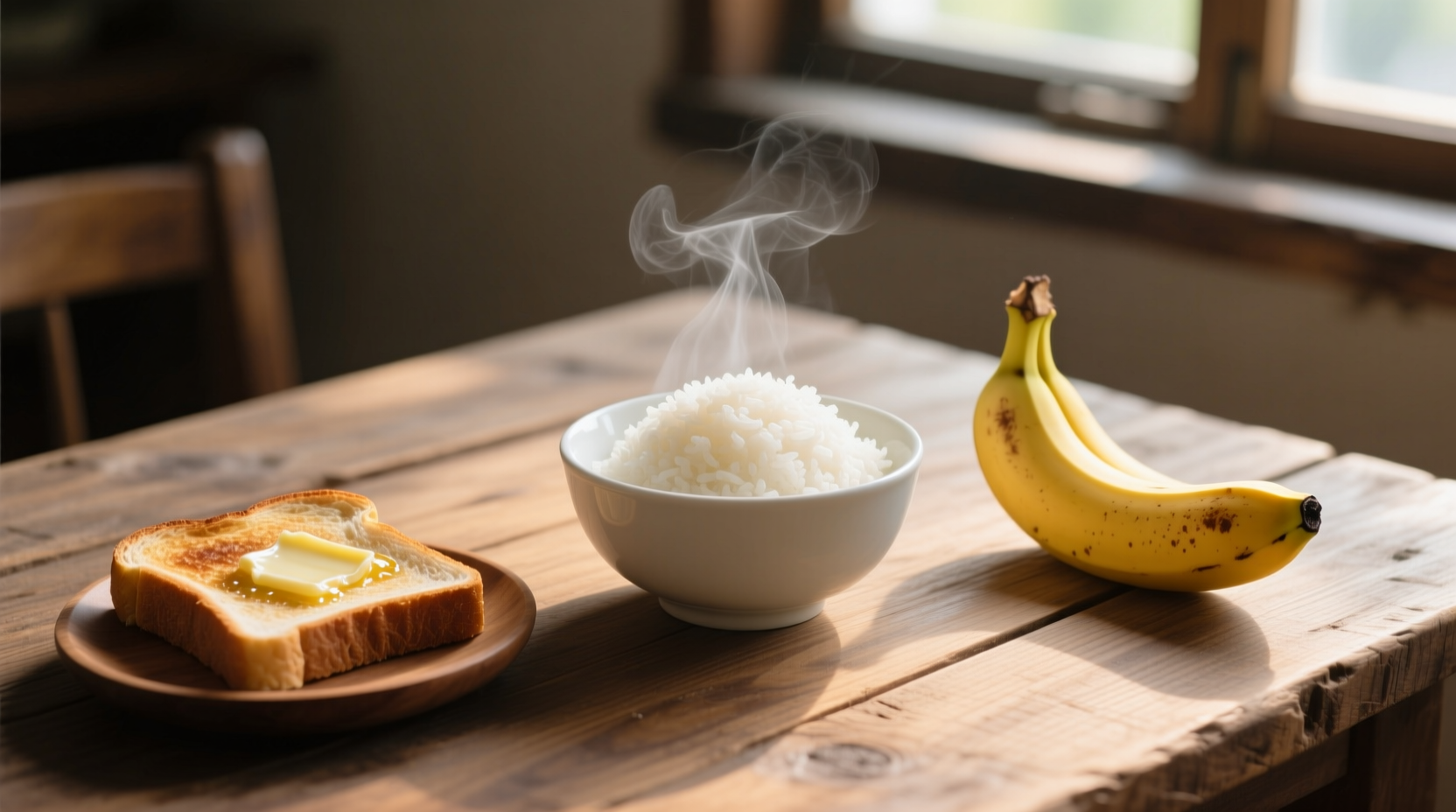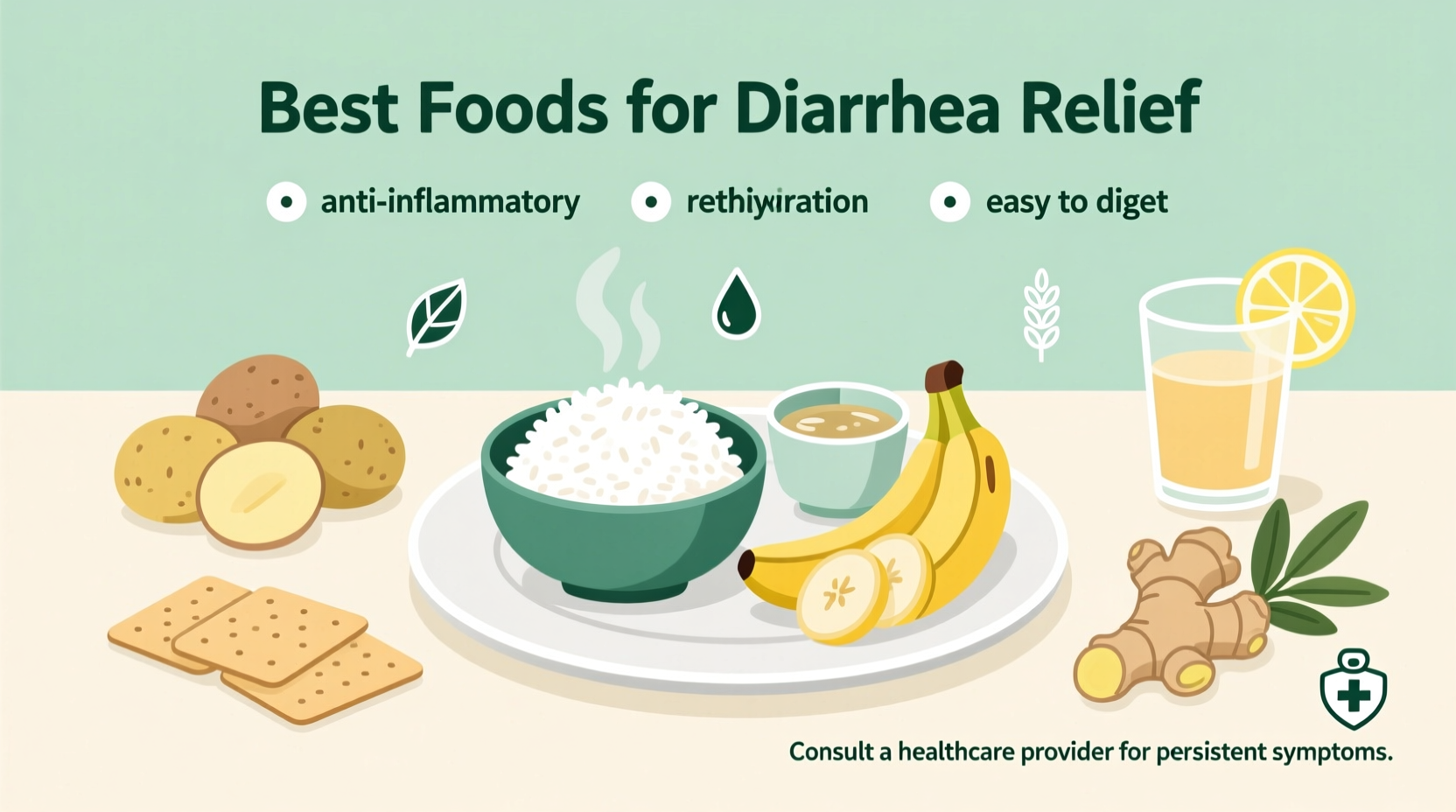If you're experiencing diarrhea, the most effective foods to help your recovery include bananas, rice, applesauce, toast (the BRAT diet), plus boiled potatoes, oatmeal, and lean proteins like boiled chicken. Crucially, you must prioritize hydration with oral rehydration solutions containing electrolytes. Avoid dairy, fatty foods, spicy dishes, and artificial sweeteners which can worsen symptoms. These recommendations are supported by medical authorities including the CDC and Mayo Clinic for most cases of acute diarrhea.
Understanding Diarrhea and Dietary Management
When diarrhea strikes, your digestive system needs gentle, easily digestible foods that help firm stools while providing essential nutrients. Modern medical guidelines have evolved beyond the traditional BRAT diet to include a wider range of nutritious options that support faster recovery without nutritional deficiencies.
Why Certain Foods Help During Diarrhea
Diarrhea occurs when your digestive system moves too quickly, preventing proper water absorption. The right foods contain specific properties that help slow digestion and absorb excess fluid:
- Soluble fiber (found in bananas, applesauce, oats) absorbs water in the digestive tract
- Binding properties in starchy foods like rice and potatoes help firm stools
- Potassium-rich foods replace electrolytes lost during diarrhea
- Lean proteins provide essential nutrients without irritating the digestive system
| Old BRAT Diet Approach | Current Medical Recommendations |
|---|---|
| Only bananas, rice, applesauce, toast | BRAT plus additional nutrient-rich options |
| Extended periods of limited diet | Return to normal diet within 24-48 hours |
| No emphasis on protein | Inclusion of lean proteins for recovery |
| Limited focus on hydration | Strong emphasis on electrolyte replacement |
Top Foods That Help With Diarrhea Recovery
Immediate Relief Options
During the first 24 hours of acute diarrhea, focus on these gentle options:
- Oral rehydration solutions (like WHO formula or commercial electrolyte drinks) - critical for preventing dehydration
- White rice - provides binding starch without irritating fiber
- Boiled potatoes (without skin) - gentle source of carbohydrates
- Plain oatmeal - contains soluble fiber that absorbs excess fluid
- Applesauce - pectin content helps firm stools

Foods to Add as You Improve
Within 24-48 hours, gradually introduce these nutrient-rich options:
- Boiled chicken or turkey (skinless) - provides essential protein for recovery
- Steamed carrots - contain pectin and are easy to digest
- Plain yogurt with live cultures (if not lactose intolerant) - helps restore gut bacteria
- Toast with a small amount of honey - provides quick energy
- Cooked cereals like cream of wheat - gentle on the digestive system
Foods to Avoid During Diarrhea
Certain foods can worsen diarrhea symptoms or delay recovery. The CDC specifically recommends avoiding these during acute episodes:
- Dairy products (except probiotic yogurt) - lactose can be difficult to digest
- Fatty or fried foods - increase intestinal contractions
- Spicy foods - irritate the digestive tract
- Artificial sweeteners (sorbitol, mannitol) - have laxative effects
- Caffeine and alcohol - dehydrate the body
- High-fiber foods (raw vegetables, whole grains) - can stimulate bowel movements
The Critical Role of Hydration
Dehydration is the most serious complication of diarrhea. The World Health Organization recommends oral rehydration therapy as the primary treatment for acute diarrhea:
For every loose stool, adults should drink at least 1 cup (240ml) of rehydration fluid. Children need smaller, more frequent amounts. A simple homemade solution contains:
- 6 level teaspoons of sugar
- ½ level teaspoon of salt
- 1 liter of clean water
This precise ratio creates an optimal electrolyte balance for absorption, as confirmed by multiple clinical studies published in the American Journal of Clinical Nutrition.
When to Seek Medical Attention
While most diarrhea cases resolve with dietary management, certain symptoms require immediate medical care:
- Diarrhea lasting more than 2 days (adults) or 24 hours (children)
- Signs of severe dehydration (dizziness, minimal urination, dry mouth)
- Blood or black stools
- High fever (above 102°F or 39°C)
- Severe abdominal pain
According to the Centers for Disease Control, infants, elderly individuals, and those with compromised immune systems should seek medical advice sooner rather than later when experiencing diarrhea.
Recovery Timeline and Dietary Progression
Understanding the typical recovery process helps manage expectations:
| Timeline | Recommended Foods | Hydration Focus |
|---|---|---|
| First 12-24 hours | Clear liquids, oral rehydration solutions, bananas, white rice | 1:1 ratio of water to electrolyte solution |
| 24-48 hours | BRAT foods plus boiled potatoes, plain oatmeal, lean proteins | Electrolyte solutions as needed, then gradual transition to water |
| 48-72 hours | Expanded diet including cooked vegetables, probiotic foods | Normal hydration patterns returning |
| 3-7 days | Gradual return to regular diet, avoiding known triggers | Maintain slightly increased fluid intake |
This progression aligns with guidelines from the American Gastroenterological Association, which emphasizes that prolonged restrictive diets can actually delay full recovery by depriving the body of essential nutrients needed for healing.
Preventing Future Episodes
After recovery, consider these dietary strategies to reduce future diarrhea episodes:
- Maintain good hand hygiene, especially before eating
- Gradually reintroduce fiber-rich foods to support gut health
- Include probiotic foods like yogurt or kefir in your regular diet
- Stay adequately hydrated throughout the day
- Identify and avoid personal food triggers
Research published in the Journal of Clinical Gastroenterology shows that regular consumption of probiotics can reduce the incidence of acute infectious diarrhea by up to 34% in healthy adults.
Special Considerations for Vulnerable Populations
Infants, young children, elderly individuals, and those with chronic conditions require special attention:
- Infants: Continue breastfeeding or formula feeding; oral rehydration solutions may be needed
- Children: Use pediatric electrolyte solutions; avoid sports drinks which have improper electrolyte balance
- Elderly: Monitor closely for dehydration signs; may need medical evaluation sooner
- Chronic conditions: Those with IBD, IBS, or diabetes should follow condition-specific protocols
The American Academy of Pediatrics specifically advises against using anti-diarrheal medications for children under 2 years without medical supervision.
Conclusion
Managing diarrhea through proper dietary choices can significantly reduce discomfort and speed recovery. Focus on gentle, binding foods while maintaining proper hydration with electrolyte solutions. Remember that most acute diarrhea cases resolve within 48-72 hours with appropriate self-care. If symptoms persist or worsen, consult a healthcare professional to rule out more serious conditions. By understanding what food helps with diarrhea and following evidence-based recommendations, you can navigate these uncomfortable episodes with greater confidence and control.











 浙公网安备
33010002000092号
浙公网安备
33010002000092号 浙B2-20120091-4
浙B2-20120091-4